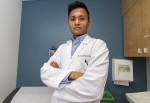An Ashe Center physician recently completed a training in transgender health education, in an attempt to improve medical services for students who identify as lesbian, gay, bisexual or transgender.
Jay Espejo, a primary care physician, began training to specialize in transgender care last May, after attending a conference that discussed the specific issues and health needs of the LGBT community. Since the conference, Espejo has focused his studies on hormone replacement.
Last November, the Human Rights Campaign recognized the UCLA Arthur Ashe Student Health and Wellness Center as an inclusive, non-discriminating service provider for LGBT patients, who often face challenges in achieving quality health care, said Geno Mehalik, the Ashe Center’s outreach manager.
“The training has not necessarily been (medically) different from training that I’ve had in the past (as a primary care physician),” Espejo said. “It’s more about understanding the culture of the transgender community and being sensitive so that they feel comfortable seeking care.”
Espejo said the transgender community often faces an unwelcome medical environment, so he thinks it’s important to create a welcoming space for these students.
Aubrey Sassoon, a fourth-year anthropology student said it can be hard for transgender patients to feel comfortable discussing gender with their doctors.
“In my experience, medical establishments can be daunting because of histories of disregard for the trans identity or of writing it off as a mental illness,” Sassoon said.
Espejo added much of his training taught him to use the correct terminology with patients and address specific health issues that are more prevalent in and important to their respective communities.
Sassoon said she thinks University of California Student Health Insurance Plan is an inclusive plan that allows students to request hormones from the pharmacy, but the Ashe Center lacks endocrinologists who have been trained in transgender medicine.
She added she sees an endocrinologist in South Bay, who a friend said was trans-friendly, because other closer doctors aren’t familiar with trans hormone treatment, don’t accept UCSHIP or won’t accept new patients.
Sassoon said she has to fast before she gets her blood work done at the medical center in South Bay, which leaves her feeling drained from the blood draw and the drive to the hospital.
She added it would be helpful to have someone on campus who could measure and look after hormone levels, so she no longer has to travel elsewhere for the treatment.
Espejo said he will continue to work as a primary care physician. If the demand for physicians for transgender treatment increases, the Ashe Center may train more physicians, he added.
He added he hopes the Ashe Center, the LGBT Center or the UCLA Counseling and Psychological Services will standardize a procedure that can be used to guide students and let them know what resources are available to them.
Espejo is the only UCLA physician to specialize in transgender care, but a number of physicians at the Ashe Center have gone through webinar-style training on different topics related to LGBT patient care, Mehalik said.
The Ashe Center has also placed posters around the building that aim to encourage students to be open about specific health needs, Mehalik said. He added they also provide information about STDs and other health care issues that may disproportionately affect the LGBT community.
Espejo said working with students and learning about their differences has been a rewarding experience.
“No individual is the same,” Espejo said. “Everyone has different characteristics and are in different stages of their life and transition.”
He added he is excited to continue to work with students because they have furthered his understanding of medicine by constantly demonstrating individual patients’ distinctive needs.
“As a doctor, you have to recognize that culture, religion and other aspects of life influence how people perceive their health and how they get their health care,” Espejo said.
Espejo said he will be better able determine whether the center needs more doctors trained in transgender health care when transgender students feel comfortable visiting the Ashe Center.
“By having access to more affirming services on campus, students who have UC insurance will not have to choose their health and bodies over their academic success,” Sassoon added.
